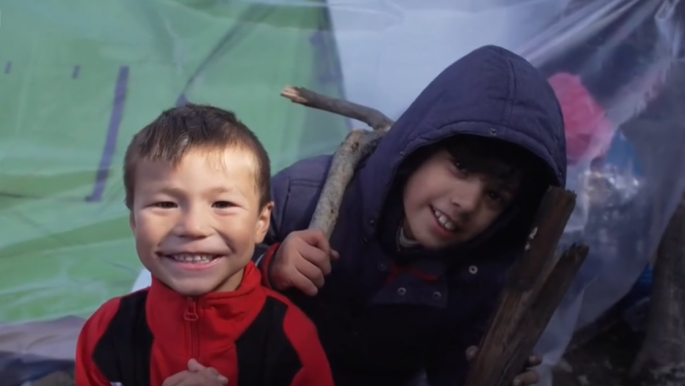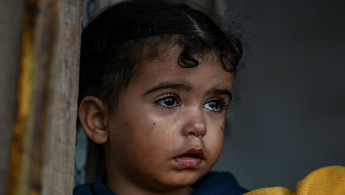Follow us on Twitter and Instagram to stay connected
Lesbos migrant camp suffering mental health crisis as children say they 'want to die'
Many children between the ages of 12 and 17 are self-harming in the camp, which is over-crowded and under terrible conditions.
3 min read
Greece's Lesbos migrant camp is experiencing a mental health crisis among its children, who have said they wish to "die".
There is an epidemic of self-harming in children between the ages of 12 and 17, with some of them attempting suicide in the Greek camp.
Nearly 18,000 people, including 7,000 children, are currently living in the camp, which was built to house just 2,000, BBC News reports.
Angela Modarelli, a child psychiatrist with Doctors Without Borders who works in the camp, told the publication:
"Hearing children of seven, eight years old saying, 'I want to die', is something that I've never thought I could actually hear."
In one mental health clinic, a 17-year-old teenager self-harmed, just one of many instances of young people hurting themselves as a result of trauma.
In the past three months Angela has dealt with 20 cases of self-harm and two suicide attempts.
"First of all we see that the living conditions of Moria camp are having a very strong effect on the mental health of children," she went on to tell the publication.
Under normal circumstances, when a child experiences trauma, they must be given time and space to recover. There is none of this in Moria.
"Moria does not allow children to recover," she said. "In a child of pre-school age, you can see children banging their head against the wall, pulling their hairs off."
Modarelli added that the crucial developmental stages - between the ages of 12 and 17 - is when children start to "cut themselves [and] strongly talk about the desire of dying".
The camps are overcrowded and underfunded as winter descends
Conditions remain overcrowded and dire in Moria despite Greece’s announcement that it plans to overhaul its camps on islands back in November.
"Decongesting the islands is a priority at this stage," the government's special coordinator for migration Alkiviadis Stefanis, a former army general and chief of staff, told a news conference at the time.
"These actions are designed to show our determination in dealing with the migrant-refuse crisis," he added.
The government intends to make borders "air-tight" and will hire 400 additional guards for the land border with Turkey and 800 for the islands, he said.
There are three camps that need closing, on the islands of Lesbos, Chios, and Samos, which currently has over 27,000 people under horrendous conditions.
It is incredibly overcrowded and has been repeatedly condemned by multiple human rights groups. Most of the camps can hold up to 4,500 people.
Plans for new facilities
Athens said it would replace the makeshift camps with solid structures and closed facilities for identification, relocation and deportation. It is thought each of these facilities will hold up to 5,000 people.
Smaller camps located on the islands of Kos and Leros are also to be remodeled in this way, with plans to relocate the asylum seekers to camps in the mainland by early 2020.
The government will also improve health facilities in areas receiving asylum-seekers and set aside a fund of 50 million euros ($55 million) for works in municipalities who agree to cooperate.
There is an epidemic of self-harming in children between the ages of 12 and 17, with some of them attempting suicide in the Greek camp.
Nearly 18,000 people, including 7,000 children, are currently living in the camp, which was built to house just 2,000, BBC News reports.
Angela Modarelli, a child psychiatrist with Doctors Without Borders who works in the camp, told the publication:
"Hearing children of seven, eight years old saying, 'I want to die', is something that I've never thought I could actually hear."
In one mental health clinic, a 17-year-old teenager self-harmed, just one of many instances of young people hurting themselves as a result of trauma.
In the past three months Angela has dealt with 20 cases of self-harm and two suicide attempts.
"First of all we see that the living conditions of Moria camp are having a very strong effect on the mental health of children," she went on to tell the publication.
Under normal circumstances, when a child experiences trauma, they must be given time and space to recover. There is none of this in Moria.
"Moria does not allow children to recover," she said. "In a child of pre-school age, you can see children banging their head against the wall, pulling their hairs off."
 |
| Children pictured in the camp [BBC screengrab] |
The camps are overcrowded and underfunded as winter descends
Conditions remain overcrowded and dire in Moria despite Greece’s announcement that it plans to overhaul its camps on islands back in November.
"Decongesting the islands is a priority at this stage," the government's special coordinator for migration Alkiviadis Stefanis, a former army general and chief of staff, told a news conference at the time.
"These actions are designed to show our determination in dealing with the migrant-refuse crisis," he added.
The government intends to make borders "air-tight" and will hire 400 additional guards for the land border with Turkey and 800 for the islands, he said.
There are three camps that need closing, on the islands of Lesbos, Chios, and Samos, which currently has over 27,000 people under horrendous conditions.
It is incredibly overcrowded and has been repeatedly condemned by multiple human rights groups. Most of the camps can hold up to 4,500 people.
Plans for new facilities
Athens said it would replace the makeshift camps with solid structures and closed facilities for identification, relocation and deportation. It is thought each of these facilities will hold up to 5,000 people.
Smaller camps located on the islands of Kos and Leros are also to be remodeled in this way, with plans to relocate the asylum seekers to camps in the mainland by early 2020.
The government will also improve health facilities in areas receiving asylum-seekers and set aside a fund of 50 million euros ($55 million) for works in municipalities who agree to cooperate.





 Follow the Middle East's top stories in English at The New Arab on Google News
Follow the Middle East's top stories in English at The New Arab on Google News
![Israeli forces ordered bombed Gaza's Jabalia, ordering residents to leave [Getty]](/sites/default/files/styles/image_330x185/public/2176418030.jpeg?h=a5f2f23a&itok=_YGZaP1z)

